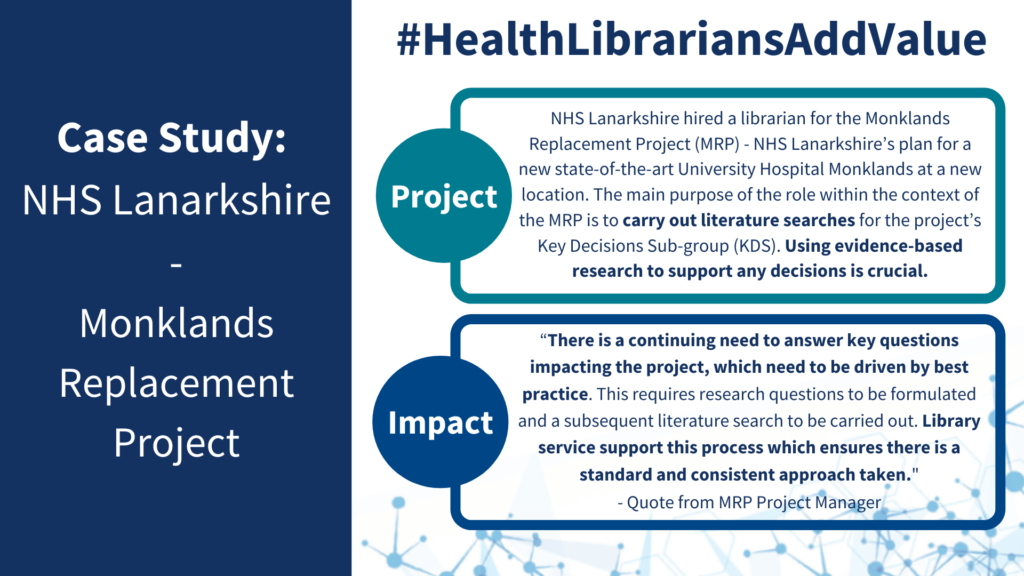Monklands Replacement Project
This case study is part of Health Librarians Add Value, a campaign run jointly by NHS Education for Scotland (NES) and CILIPS. It has been provided by Charlotte Dunn, Knowledge Services Officer at NHS Lanarkshire. Read other case studies here.
Outline of project
The Monklands Replacement Project (MRP) is NHS Lanarkshire’s plan for a new state-of-the-art University Hospital Monklands at a new location. Due to the age of the existing Monklands, the design and facilities are no longer fit for purpose. Plans for the building of a new hospital have been approved by the Scottish Government, with three potential sites being considered for its new location.
Earlier this year NHS Lanarkshire recruited for a new Knowledge Services Officer post to work directly with the Monklands Replacement Programme, which I started in May. Based in the existing Monklands’ library (although working from home for the first few months due to the Coronavirus pandemic), I work with the MRP team for half of the working week and act as a link between the project and NHS Lanarkshire’s library services.
The main purpose of the role within the context of the MRP is to carry out literature searches for the project’s Key Decisions Sub-group (KDS). The role of Knowledge Services Officer contributes to the project by assisting members of the KDS to find evidence to inform any decisions that have to be made in relation to the building or design of the new hospital. Due to the cost and nature of the project, it is likely to attract a high level of scrutiny. Using evidence-based research to support any decisions is therefore crucial.
By having a member of the library team with knowledge of the relevant databases and the formation of search strategies, members of the KDS have support in setting research questions and an experienced information professional to carry out literature searches on their behalf.
The nature of the literature searches carried out for the project can vary from clinical, to operational, to design-related. Each literature search usually begins with a discussion with the KDS member responsible for carrying out the research, in order to determine what exactly they are looking for, setting the question, and establishing keywords. From this discussion, a search strategy is formed, and the search is carried out using databases relevant to the subject area. Relevant articles and documents are then identified and collated before being passed on to the KDS member for evaluation.
The role of Knowledge Services Officer for the MRP aims to provide the project with access to an information professional with experience in using relevant databases and the formation of search strategies, in order to find relevant evidence to support the decisions being made with regards to the building of the new hospital. The evidence gathered through these literature searches is absolutely necessary in order to ensure the decisions made stand up to scrutiny.
Impact
Reflecting on the support received from the Knowledge Services Officer for this project, Kathryn Henderson, MRP Project Manager, said:
Having support from Library Services across the scope of the project is invaluable. There is a continuing need to answer key questions impacting the project, which need to be driven by best practice. This requires research questions to be formulated and a subsequent literature search to be carried out. Library service support this process which ensures there is a standard and consistent approach taken. In addition, using library services undoubtedly improves the efficiency of the process by ensuring the research question is specific and sufficiently detailed to yield a literature return that is relevant. From a project resource point of view this saves significant time and effort.
Reflecting on her involvement with the project, Charlotte Dunn, Knowledge Services Officer, said:
Since I joined the Knowledge Services team in May, the average number of literature searches carried out each month for the MRP has more than doubled. The average time spent on each individual search is over 10 hours. Due to the increased demand for literature searches for the project, existing library staff would have struggled to address these in a timely fashion alongside their usual workload. By having a dedicated member of the library team on the project, questions can be researched and returned to the KDS in a timely manner. This means that the team have access to relevant search results quicker, and are able to progress with their work using evidence-based research.
